A Theory for Observational Fault Tolerance (Extended Abstract)
- 格式:pdf
- 大小:148.67 KB
- 文档页数:15
![小学上册第十一次英语第3单元期末试卷[含答案]](https://uimg.taocdn.com/a40e9a64b42acfc789eb172ded630b1c58ee9b7c.webp)
小学上册英语第3单元期末试卷[含答案]英语试题一、综合题(本题有50小题,每小题1分,共100分.每小题不选、错误,均不给分)1 My grandpa enjoys telling ____.2 The __________ (政治运动) can lead to social change.3 The penguin waddles on the ______ (冰). It is very ______ (可爱).4 We should learn about ______ (植物的) importance.5 The chemical formula for sodium acetate is _______.6 A bee gathers _______ from flowers to create delicious honey.7 How many months are in a year?A. TenB. ElevenC. TwelveD. Thirteen答案:C8 The __________ (历史的视角) can change over time.9 What do we call a scientist who studies the effects of pollution?a. Environmental scientistb. Ecologistc. Biologistd. Chemist答案:a10 Plants need ________ (水) to survive.11 A hot spot is a location where magma rises from deep within the ______.12 The dog is ___ (digging/sitting).13 The chemical formula for mercury(II) chloride is ______.14 Atoms are primarily made up of _____.15 My toy ____ can talk and tell stories. (玩具名称)16 I like to __________ (动词) my __________ (玩具名) with my friends.17 What is 100 25?a. 75b. 80c. 85d. 90答案:a18 A chemical change is usually difficult to _______.19 The concept of ecosystem demonstrates the interaction between living and ______ things.20 What is the name of the first satellite sent into space?A. Apollo 11B. SputnikC. Voyager 1D. Hubble21 Planting a variety of species can create a more resilient ______. (种植多样的物种可以创造出更强韧的生态系统。
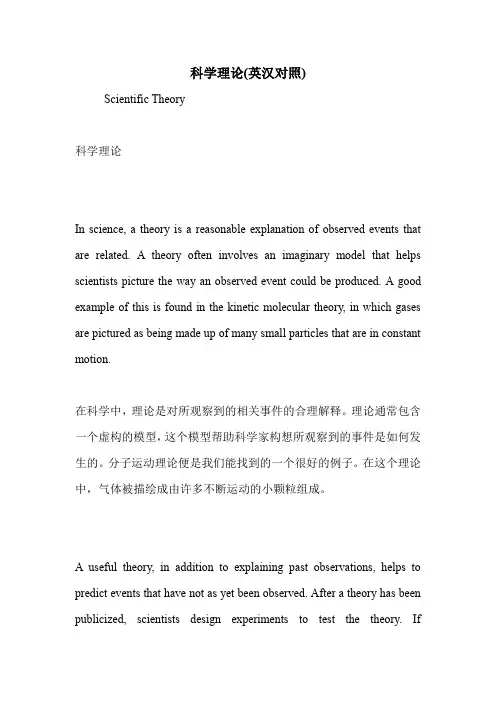
科学理论(英汉对照)Scientific Theory科学理论In science, a theory is a reasonable explanation of observed events that are related. A theory often involves an imaginary model that helps scientists picture the way an observed event could be produced. A good example of this is found in the kinetic molecular theory, in which gases are pictured as being made up of many small particles that are in constant motion.在科学中,理论是对所观察到的相关事件的合理解释。
理论通常包含一个虚构的模型,这个模型帮助科学家构想所观察到的事件是如何发生的。
分子运动理论便是我们能找到的一个很好的例子。
在这个理论中,气体被描绘成由许多不断运动的小颗粒组成。
A useful theory, in addition to explaining past observations, helps to predict events that have not as yet been observed. After a theory has been publicized, scientists design experiments to test the theory. Ifobservations confirm the scientists predictions, the theory is supported. If observations do not confirm the predictions, the scientists must search further. There may be a fault in the experiment, or the theory may have to be revised or rejected.一个有用的理论,除了能够解释过去的观测,还有助于预测那些未被观测到的事件。
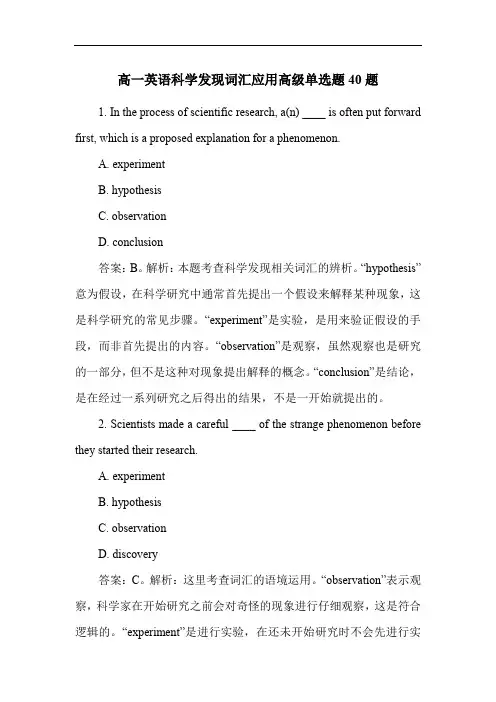
高一英语科学发现词汇应用高级单选题40题1. In the process of scientific research, a(n) ____ is often put forward first, which is a proposed explanation for a phenomenon.A. experimentB. hypothesisC. observationD. conclusion答案:B。
解析:本题考查科学发现相关词汇的辨析。
“hypothesis”意为假设,在科学研究中通常首先提出一个假设来解释某种现象,这是科学研究的常见步骤。
“experiment”是实验,是用来验证假设的手段,而非首先提出的内容。
“observation”是观察,虽然观察也是研究的一部分,但不是这种对现象提出解释的概念。
“conclusion”是结论,是在经过一系列研究之后得出的结果,不是一开始就提出的。
2. Scientists made a careful ____ of the strange phenomenon before they started their research.A. experimentB. hypothesisC. observationD. discovery答案:C。
解析:这里考查词汇的语境运用。
“observation”表示观察,科学家在开始研究之前会对奇怪的现象进行仔细观察,这是符合逻辑的。
“experiment”是进行实验,在还未开始研究时不会先进行实验。
“hypothesis”是假设,此时还未到提出假设的阶段。
“discovery”是发现,这里强调的是对现象的观察过程,而不是发现这个结果。
3. The ____ they designed was very complicated but it could test their hypothesis effectively.A. experimentB. observationC. conclusionD. theory答案:A。
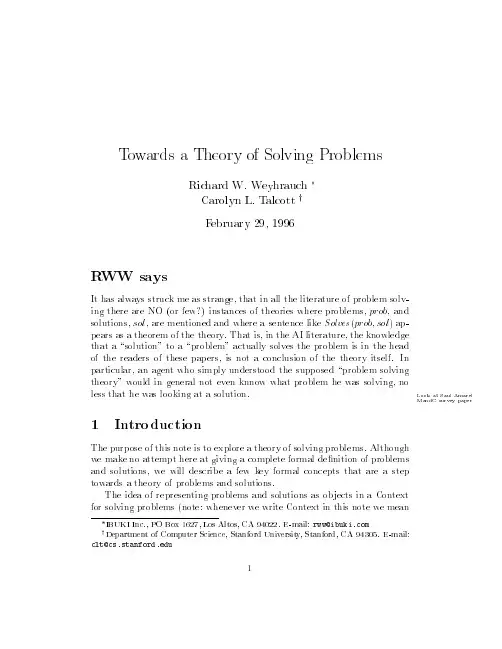
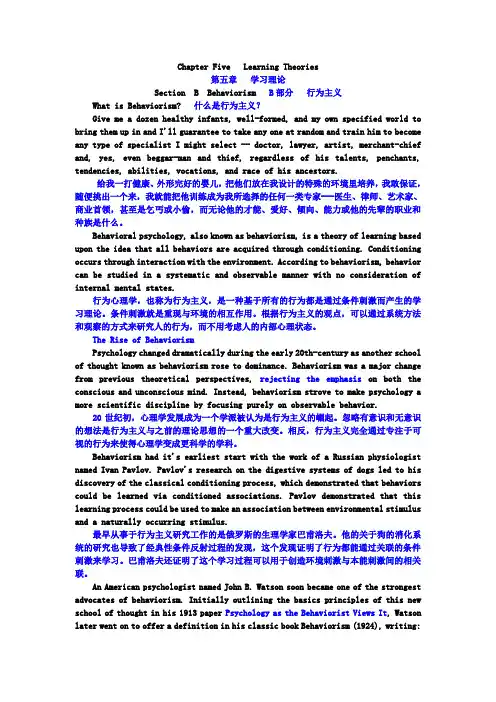
Chapter Five Learning Theories第五章学习理论Section B Behaviorism B部分行为主义What is Behaviorism? 什么是行为主义?Give me a dozen healthy infants, well-formed, and my own specified world to bring them up in and I'll guarantee to take any one at random and train him to become any type of specialist I might select -- doctor, lawyer, artist, merchant-chief and, yes, even beggar-man and thief, regardless of his talents, penchants, tendencies, abilities, vocations, and race of his ancestors.给我一打健康、外形完好的婴儿,把他们放在我设计的特殊的环境里培养,我敢保证,随便挑出一个来,我就能把他训练成为我所选择的任何一类专家---医生、律师、艺术家、商业首领,甚至是乞丐或小偷,而无论他的才能、爱好、倾向、能力或他的先辈的职业和种族是什么。
Behavioral psychology, also known as behaviorism, is a theory of learning based upon the idea that all behaviors are acquired through conditioning.Conditioning occurs through interaction with the environment.According to behaviorism, behavior can be studied in a systematic and observable manner with no consideration of internal mental states.行为心理学,也称为行为主义,是一种基于所有的行为都是通过条件刺激而产生的学习理论。
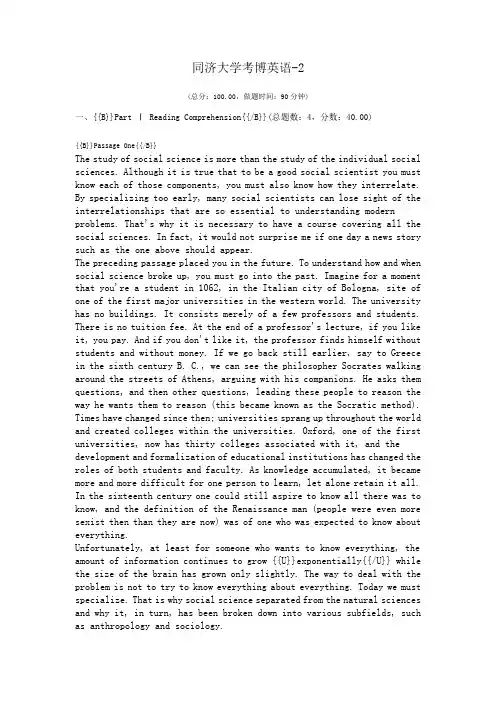
同济大学考博英语-2(总分:100.00,做题时间:90分钟)一、{{B}}Part Ⅰ Reading Comprehension{{/B}}(总题数:4,分数:40.00){{B}}Passage One{{/B}}The study of social science is more than the study of the individual social sciences. Although it is true that to be a good social scientist you must know each of those components, you must also know how they interrelate. By specializing too early, many social scientists can lose sight of the interrelationships that are so essential to understanding modern problems. That's why it is necessary to have a course covering all the social sciences. In fact, it would not surprise me if one day a news story such as the one above should appear.The preceding passage placed you in the future. To understand how and when social science broke up, you must go into the past. Imagine for a moment that you're a student in 1062, in the Italian city of Bologna, site of one of the first major universities in the western world. The university has no buildings. It consists merely of a few professors and students. There is no tuition fee. At the end of a professor's lecture, if you like it, you pay. And if you don't like it, the professor finds himself without students and without money. If we go back still earlier, say to Greece in the sixth century B. C., we can see the philosopher Socrates walking around the streets of Athens, arguing with his companions. He asks them questions, and then other questions, leading these people to reason the way he wants them to reason (this became known as the Socratic method). Times have changed since then; universities sprang up throughout the world and created colleges within the universities. Oxford, one of the first universities, now has thirty colleges associated with it, and the development and formalization of educational institutions has changed the roles of both students and faculty. As knowledge accumulated, it became more and more difficult for one person to learn, let alone retain it all. In the sixteenth century one could still aspire to know all there was to know, and the definition of the Renaissance man (people were even more sexist then than they are now) was of one who was expected to know about everything.Unfortunately, at least for someone who wants to know everything, the amount of information continues to grow {{U}}exponentially{{/U}} while the size of the brain has grown only slightly. The way to deal with the problem is not to try to know everything about everything. Today we must specialize. That is why social science separated from the natural sciences and why it, in turn, has been broken down into various subfields, such as anthropology and sociology.(分数:10.00)(1).What is the main idea of this text?(分数:2.00)A.Social science is unified. √B.Social science is a newborn science.C.What is social science.D.Specialization in social science is not good.解析:[解析] 文章第1句即为题旨所在:“The study of social science is more than the study of the individual social sciences.”(2).What can we learn from the second paragraph?(分数:2.00)A.Socrates can be regarded as the first social scientist in the western world.B.The universities in Italy have no buildings.C.Socrates created the "Socratic method". √D.Greece is not as civilized as Italy.解析:[解析] Socratic method以苏格拉底的名字命名,并且为他所第一个使用。
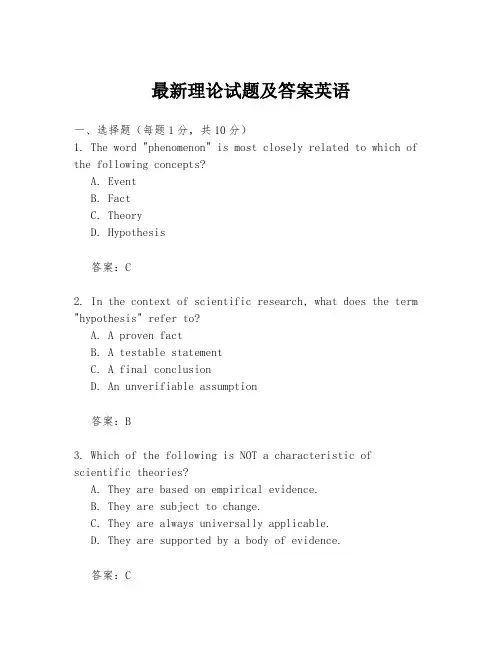
最新理论试题及答案英语一、选择题(每题1分,共10分)1. The word "phenomenon" is most closely related to which of the following concepts?A. EventB. FactC. TheoryD. Hypothesis答案:C2. In the context of scientific research, what does the term "hypothesis" refer to?A. A proven factB. A testable statementC. A final conclusionD. An unverifiable assumption答案:B3. Which of the following is NOT a characteristic of scientific theories?A. They are based on empirical evidence.B. They are subject to change.C. They are always universally applicable.D. They are supported by a body of evidence.答案:C4. The scientific method typically involves which of the following steps?A. Observation, hypothesis, experimentation, conclusionB. Hypothesis, observation, conclusion, experimentationC. Experimentation, hypothesis, observation, conclusionD. Conclusion, hypothesis, observation, experimentation答案:A5. What is the role of experimentation in the scientific process?A. To confirm a hypothesisB. To disprove a hypothesisC. To provide evidence for or against a hypothesisD. To replace the need for a hypothesis答案:C6. The term "paradigm shift" in the philosophy of science refers to:A. A minor change in scientific theoryB. A significant change in the dominant scientific viewC. The process of scientific discoveryD. The end of scientific inquiry答案:B7. Which of the following is an example of inductive reasoning?A. Observing a pattern and making a general ruleB. Drawing a specific conclusion from a general ruleC. Making a prediction based on a hypothesisD. Testing a hypothesis through experimentation答案:A8. Deductive reasoning is characterized by:A. Starting with a specific observation and drawing a general conclusionB. Starting with a general rule and applying it to a specific caseC. Making assumptions without evidenceD. Relying on intuition rather than logic答案:B9. In scientific research, what is the purpose of a control group?A. To provide a baseline for comparisonB. To test an alternative hypothesisC. To increase the number of participantsD. To confirm the results of previous studies答案:A10. The principle of falsifiability, introduced by Karl Popper, suggests that:A. Scientific theories must be proven trueB. Scientific theories must be able to withstand attempts at being disprovenC. Scientific theories are never wrongD. Scientific theories are always based on personal beliefs答案:B二、填空题(每题1分,共5分)1. The scientific method is a systematic approach to__________ knowledge through observation, experimentation, and __________.答案:gaining; logical reasoning2. A scientific law is a statement that describes a__________ pattern observed in nature, while a scientific theory explains the __________ behind these patterns.答案:recurring; underlying principles3. The process of peer review in scientific publishing is important because it helps to ensure the __________ and__________ of research findings.答案:validity; reliability4. In the context of scientific inquiry, an __________ is a tentative explanation for an aspect of the natural world that is based on a limited range of __________.答案:hypothesis; observations5. The term "empirical" refers to knowledge that is based on __________ and observation, rather than on theory or__________.答案:experimentation; speculation三、简答题(每题5分,共10分)1. Explain the difference between a scientific theory and a scientific law.答案:A scientific theory is a well-substantiated explanation of some aspect of the natural world, based on a body of facts that have been repeatedly confirmed through observation and experimentation. It is a broad framework that can encompass multiple laws and observations. A scientific law, on the other hand, is a concise verbal or mathematical statement that describes a general pattern observed in nature. Laws summarize specific phenomena, while theories explain the broader principles behind those phenomena.2. What is the significance of the falsifiability criterionin the philosophy of science?答案:The falsifiability criterion, proposed byphilosopher of science Karl Popper, is significant because it provides a way to distinguish between scientific and non-scientific theories. For a theory to be considered scientific, it must be testable and potentially refutable by empirical evidence. This criterion ensures that scientific theories are open。
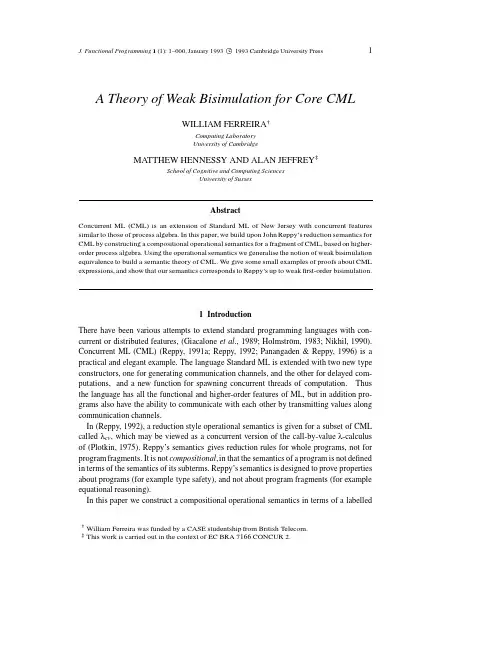
J.Functional Programming1(1):1–000,January1993c1993Cambridge University Press1A Theory of Weak Bisimulation for Core CMLWILLIAM FERREIRA†Computing LaboratoryUniversity of CambridgeMATTHEW HENNESSY AND ALAN JEFFREY‡School of Cognitive and Computing SciencesUniversity of Sussex1IntroductionThere have been various attempts to extend standard programming languages with con-current or distributed features,(Giacalone et al.,1989;Holmstr¨o m,1983;Nikhil,1990). Concurrent ML(CML)(Reppy,1991a;Reppy,1992;Panangaden&Reppy,1996)is a practical and elegant example.The language Standard ML is extended with two new type constructors,one for generating communication channels,and the other for delayed com-putations,and a new function for spawning concurrent threads of computation.Thus the language has all the functional and higher-order features of ML,but in addition pro-grams also have the ability to communicate with each other by transmitting values along communication channels.In(Reppy,1992),a reduction style operational semantics is given for a subset of CML calledλcv,which may be viewed as a concurrent version of the call-by-valueλ-calculus of(Plotkin,1975).Reppy’s semantics gives reduction rules for whole programs,not for program fragments.It is not compositional,in that the semantics of a program is not defined in terms of the semantics of its subterms.Reppy’s semantics is designed to prove properties about programs(for example type safety),and not about program fragments(for example equational reasoning).In this paper we construct a compositional operational semantics in terms of a labelled †William Ferreira was funded by a CASE studentship from British Telecom.‡This work is carried out in the context of EC BRA7166CONCUR2.2W.Ferreira,M.Hennessy and A.S.A.Jeffreytransition system,for a core subset of CML which we callµCML.This semantics not only describes the evaluation steps of programs,as in(Reppy,1992),but also their communi-cation potentials in terms of their ability to input and output values along communication channels.This semantics extends the semantics of higher-order processes(Thomsen,1995) with types andfirst-class functions.We then proceed to demonstrate the usefulness of this semantics by using it to define a version of weak bisimulation,(Milner,1989),suitable forµCML.We prove that,modulo the usual problems associated with the choice operator of CCS,our chosen equivalence is preserved by allµCML contexts and therefore may be used as the basis for reasoning about CML programs.In this paper we do not investigate in detail the resulting theory but confine ourselves to pointing out some of its salient features;for example standard identities one would expect of a call-by-valueλ-calculus are given and we also show that certain algebraic laws common to process algebras,(Milner,1989),hold.We now explain in more detail the contents of the remainder of the paper.In Section2we describeµCML,a monomorphically typed core subset of CML,which nonetheless includes base types for channel names,booleans and integers,and type con-structors for pairs,functions,and delayed computations which are known as events.µCML also includes a selection of the constructs and constants for manipulating event types,such as and for constructing basic events for sending and receiving values, for combining delayed computations,for selecting between delayed compu-tations,and a function for launching new concurrent threads of computation within a program.The major omission is thatµCML has no facility for generating new channel names.However we believe that this can be remedied by using techniques common to the π-calculus,(Milner,1991;Milner et al.,1992;Sangiorgi,1992).In the remainder of this section we present the operational semantics ofµCML in terms of a labelled transition system.In order to describe all possible states which can arise dur-ing the computation of a well-typedµCML program we need to extend the language.This extension is twofold.Thefirst consists in adding the constants of event type used by Reppy in(Reppy,1992)to defineλcv,i.e.constants to denote certain delayed computations.This extended language,which we callµCML cv,essentially coincides with theλcv,the lan-guage used in(Reppy,1992),except for the omissions cited above.However to obtain a compositional semantics we make further extensions toµCML cv.We add a parallel oper-ator,commonly used in process algebras,which allows us to use programs in place of the multisets of programs of(Reppy,1992).Thefinal addition is more subtle;we include inµCML cv expressions which correspond to the ed versions of Reppy’s constants for representing delayed computations.Thus the labelled transition system uses as states programs from a language which we call µCML.This language is a superset ofµCML cv,which is our version of Reppy’sλcv, which in turn is a superset ofµCML,our mini-version of CML.The following diagramA Theory of Weak Bisimulation for Core CML3indicates the relationships between these languages:µCMLλcvCMLIn Section3we discuss semantic equivalences defined on the labelled transition of Sec-tion2.We demonstrate the inadequacies of the obvious adaptations of strong and weak bisimulation equivalence,(Milner,1989),and then consider adaptations of higher-order and irreflexive bisimulations from(Thomsen,1995).Finally we suggest a new variation called hereditary bisimulation equivalence which overcomes some of the problems en-countered with using higher-order and irreflexive bisimulations.In Section4we show that hereditary bisimulation is preserved by allµCML contexts.This is an application of the proof method originally suggested in(Howe,1989)but the proof is further complicated by the fact that hereditary bisimulations are defined in terms of pairs of relations satisfying mutually dependent properties.In Section5we briefly discuss the resulting algebraic theory ofµCML expressions.This paper is intended only to lay the foundations of this theory and so here we simply indicate that our theory extends both that of call-by-valueλ-calculus(Plotkin,1975)and process algebras(Milner,1989).In Section6we show that,up to weak bisimulation equivalence,our semantics coincides with the reduction semantics forλcv presented in(Reppy,1992).This technical result ap-plies only to the common sub-language,namelyµCML cv.In Section7we briefly consider other approaches to the semantics of CML and related languages and we end with some suggestions for further work.2The LanguageIn this section we introduce our languageµCML,a subset of Concurrent ML(Reppy, 1991a;Reppy,1992;Panangaden&Reppy,1996).We describe the syntax,including a typing system,and an operational semantics in terms of a labelled transition system. Unfortunately,there is not enough space in this paper to provide an introduction to pro-gramming in CML:see(Panangaden&Reppy,1996)for a discussion of the design and philosophy of CML.The type expressions for our language are given by:A::A A A A A AThus we have three base types,,and;the latter two are simply examples of useful base types and one could easily include more.These types are closed under four con-structors:pairing,function space,and the less common and type constructors.4W.Ferreira,M.Hennessy and A.S.A.JeffreyOur language may be viewed as a typedλ-calculus augmented with the type constructors A for communication channels sending and receiving data of type A,and A for constructing delayed computations of type A.Let Chan A be a type-indexed family of disjoint sets of channel names,ranged over by k, and let Var denote a set of variables ranged over by x,y and z.The expressions ofµCML are given by the following abstract syntax:e f g Exp::v ce e e e e e x e e eev w Val::x y e x k01c Const::The main syntactic category is that of Exp which look very much like the set of expressions for an applied call-by-value version of theλ-calculus.There are the usual pairing,let-binding and branching constructors,and two forms of application:the application of one expression to another,ee,the application of a constant to an expression,ce.There is also a syntactic category of value expressions Val,used in giving a semantics to call-by-value functions and communicate-by-value channels.They are restricted in form: either a variable,a recursively defined function,x y e,or a predefined literal value for the base types.We will use some syntax sugar,writing y e for x y e when x does not occur in e,and e;f for x e f when x does not occur in f. Finally there are a small collection of constant functions.These consist of a representa-tive sample of constants for manipulating objects of base type,,which could easily be extended,the projection functions and,together with the set of constants for manipulating delayed computations taken directly from(Reppy,1992):and,for constructing delayed computations which can send and receive values,,for constructing alternatives between delayed computations,,for spawning new computational threads,,for launching delayed computations,,for combining delayed computations,,for a delayed computation which always deadlocks,and,for a delayed computation which immediately terminates with a value. Note that there is no method for generating channel names other than using the predefined set of names Chan A.There are two constructs in the language which bind occurrences of variables,xe1e2where free occurrences of x in e2are bound and x y e where free oc-currences of both x and y in e are bound.We will not dwell on the precise definitions of free and bound variables but simply use f v e to denote the set of variables which have free occurrences in e.If f v e/0then e is said to be a closed expression,which we sometimes refer to as a program.We also use the standard notation of e v x to denote the substitution of the value v for all free occurrences of x in e where bound names may be changed in order to avoid the capture of free variables in v.(Since we are modelling aA Theory of Weak Bisimulation for Core CML5:A B A:A A:A B B:A A::A A A::::A A B B:A A:A:A AFigure1a.Type rules forµCML constant functionsx yΓx:A y:BΓ:Γ:Γx y e:A BΓe:AΓf:BΓe:AΓe f:BΓe:AΓx:A f:BΓe f g:A6W.Ferreira,M.Hennessy and A.S.A.Jeffreythis reduction semantics are of the form:CτCwhere C C are configurations which combine a closed expression with a run-time envi-ronment necessary for its evaluation,andτis Milner’s notation for a silent action.However this semantics is not compositional as the reductions of an expression can not be deduced directly from the reductions of it constituent components.Here we give a compositional operational semantics with four kinds of judgements:eτe,representing a one step evaluation or reduction,e v e,representing the production of the value v,with a side effect e,e k?x e,representing the potential to input a value x along the channel k,ande k!v e,representing the output of the value v along the channel k.These are formally defined in Figure2,but wefirst give an informal overview.In order to define these relations we introduce extra syntactic constructs.These are introduced as required in the overview but are summarized in Figure3.The rules for one step evaluation or reduction have much in common with those for a standard call-by-valueλ-calculus.But in addition a closed expression e of type A should evaluate to a value of type A and it is this production of values which is the subject of the second kind of judgement.HoweverµCML expressions can spawn subprocesses before returning a value,so we have to allow expressions to continue evaluation even after they have returned a result.For example in the expression:0a;aone possible reduction is(whereτindicates a sequence ofτ-reductions):0a;aτa?11a!0where the process returns the value1before outputting0.For this reason we need a reduc-tion e v e rather than the more usual termination e v.The following diagram illustrates all of the possible transitions from this expression:0a;aτa!0τa?vva!0vA Theory of Weak Bisimulation for Core CML7 judgements of the operational semantics apply to these configurations.The second,more common in work on process algebras,(Bergstra&Klop,1985;Milner,1989),extends the syntax of the language being interpreted to encompass configurations.We choose the latter approach and one extra construct we add to the language is a parallel operator,e f.This has the same operational rules as in CCS,allowing reduction of both processes:eαee fαe fand communication between the processes:e k!v ef k?x fe fτe v x fThe assymetry is introduced by termination(a feature missing from CCS).A CML process has a main thread of control,and only the main thread can return a value.By convention, we write the main thread on the right,so the rule is:f v feαeSecondly,e may have spawned some concurrent processes before returning a function,and these should carry on evaluation,so we use the silent rule for constant application:e v e8W.Ferreira,M.Hennessy and A.S.A.JeffreyThe well-typedness of the operational semantics will ensure that v is a function of the appropriate type,.With this method of representing newly created computation threads more of the rules corresponding toβ-reduction in a call-by-valueλ-calculus may now be given.To evaluate an application expression e f,first e is evaluated to a value of functional form and then the evaluation of f is initiated.This is represented by the rules:eαee fτe yf g(In fact we use a slightly more complicated version of the latter rule as functions are al-lowed to be recursive.)Continuing with the evaluation of e f,we now evaluate f to a value which is then substituted into g for y.This is represented by the two rules:fτfx f gτf g v xThe evaluation of the application expression c f is similar;f is evaluated to a value and then the constant c is applied to the resulting value.This is represented by the two rulesfτfc fτfδc vHere,borrowing the notation of(Reppy,1992),we use the functionδto represent the effect of applying the constant c to the value v.This effect depends on the constant in question and we have already seen one instance of this rule,for the constant,which result from the fact thatδv v.The definition ofδfor all constants in the language is given in Figure2f.For the constants associated with the base types this is self-explanatory; the others will be explained below as the constant in question is considered.Note that because of the introduction of into the language we can treat all constants uniformly, unlike(Reppy,1992)where and have to considered in a special manner.In order to implement the standard left-to-right evaluation of pairs of expressions we introduce a new value v w representing a pair which has been fully evaluated.Then to evaluate e f:first allow e to evaluate:eαee fτe xf v xThese value pairs may then be used by being applied to functions of type A B.For example the following inferences result from the definition of the functionδfor the constants and:e v w eeτe m nIt remains to explain how delayed computations,i.e.programs of type A,are han-dled.It is important to realise that expressions of type A represent potential rather than actual computations and this potential can only be activated by an application of theA Theory of Weak Bisimulation for Core CML9eαee fαe feαee f gαe f geαee fαef fαfe f v e fFigure2a.Operational semantics:static rules ge1αege1ge2αegeαeceτeδc v e ee f gτe ge v ee fτe yfg v xv x y g e v ee fτef v xe k?x ef k!v fv vΛk?k?x x10W.Ferreira,M.Hennessy and A.S.A.Jeffreye f g Exp::v ce e e e e e x e e eev w Val::x y e x k01c Const::Figure3a.Syntax ofµCMLv w Val::v v gege GExp::v!v v?ge v ge geΛA vFigure3b.Syntax ofµCML cve f g Exp::ge e eFigure3c.Syntax ofµCMLconstant,of type A A.Thus for example the expression k is of type A and represents a delayed computation which has the potential to receive a value of type A along the channel k.The expression k can actually receive such a value v along channel k,or more accurately can evaluate to such a value,provided some other computation thread can send the value along channel k.The semantics of is handled by introducing a new constructor for values.For certain kinds of expressions ge of type A,which we call guarded expressions,let ge be a value of type A;this represents a delayed computation which when launched initiates a new computation thread which evaluates the expression ge.Then the expression ge reduces in one step to the expression ge.More generally the evaluation of the expressione proceeds as follows:First evaluate e until it can produce a value:eτeeτe geNote that here,as always,the production of a value may have as a side-effect the generation of a new computation thread e and this is launched concurrently with the delayed compu-tation ge.Also both of these rules are instances of more general rules already considered. Thefirst is obtained from the rule for the evaluation of applications of the form ce and the second by definingδge to be ge.The precise syntax for guarded expressions will emerge by considering what types of values of the form e can result from the evaluation of expressions of type from the basic languageµCML.The constant is of type A A and thereforethe evaluation of the expression e proceeds byfirst evaluating e to a value of type A until it returns a value k,and then returning a delayed computation consisting of an event which can receive any value of type A on the channel k.To represent this event we extend the syntax further by letting k?be a guarded expression for any k and A,with the associated rule:e k eeτe k!vIt is these two new expressions k?and k!v which perform communication between compu-tation threads.Formally k!v is of type and we have the axiom:k?k?x xTherefore in general input moves are of the form e k?x f where e:B and x:A f:B. Communication can now be modelled as in CCS by the simultaneous occurrence of input and output actions:e k?x ef k!v feτeΛobtained,once more,by definingδto beΛ.The constant is of type A A B B.The evaluation of e proceeds in the standard way by evaluating e until it produces a value,which must be of the form ge v,where ge is a guarded expression of type A and v has type A B.Then the evaluation of e continues by the construction of the new delayed computation ge v.Bearing in mind the fact that the production of values can generate new computation threads,this is formally represented by the inference rule:e ge v ege vαveThe construct,of type A A,evaluates its argument to a value v,and thenreturns a trivial a delayed computation;this computation,when activated,immediately evaluates to the value v.In order to represent these trivial computations we introduce a new constructor for guarded expressions,A and the semantics of is then captured by the rule:e v eA vτvThe choice construct e is a choice between delayed computations as has the type A A A.To interpret it we introduce a new choice constructor ge1ge2where ge1and ge2are guarded expressions of the same type.Then e pro-ceeds by evaluating e until it can produce a value,which must be of the form ge1ge2, and the evaluation continues by constructing the delayed computation ge1ge2.This is represented by the rule:e ge1ge2ege2αege1ge2αeΓv:AΓw:BΓge:AΓv:AΓw:AΓv?:AΓge:AΓv:A BΓge1ge2:AΓA v:AΓe:AΓf:BΓτ:A Γv:AΓk?x:AΓw:Bof the form e k ?xf where f may be an open expression we need to consider relations over open expressions.Let an open type-indexed relation R be a family of relations R ΓA such that if e R ΓA f then Γe :A and Γf :A .We will often elide the subscripts from relations,for example writing e R f for e R ΓA f when context makes the type obvious.Let a closed type-indexed relation R be an open type-indexed relation where Γis everywhere the empty context,and can therefore be elided.For any closed type-indexed relation R ,let its open extension R be defined as:e R x :A Bf iff e v x R B f v x for allv :AA closed type-indexed relation R is structure preserving iff:if v R A w and A is a base type then v w ,if v 1v 2R A 1A 2w 1w 2then v i R A i w i ,if ge 1R A ge 2then ge 1R A ge 2,andif v R A B v then for all w :A we have vw R B v w .With this notation we can now define strong bisimulations over µCML expressions.A closed type-indexed relation R is a first-order strong simulation iff it is structure-preserving and the following diagram can be completed:e 1R e 2e 1R e 2ase 1lRe 2lsince the definition of strong bisimulation demands that the actions performed by expres-sions match up to syntactic identity.This counter-example can also be reproduced using only µCML contexts:kx121kx21since the left hand side can perform the move:kx12τk !x12but this can only be matched by the right hand side up to strong bisimulation:kx21τk !x21In fact,it is easy to verify that the only first-order strong bisimulation which is a congruence for µCML is the identity relation.To find a satisfactory treatment of bisimulation for µCML,we need to look to higher-order bisimulation ,where the structure of the labels is accounted for.To this end,given a closed type-indexed relation R ,define its extension to labels R l as:v R l A wk !v R l A k !wkChan BThen R is a higher-order strong simulation iff it is structure-preserving and the followingdiagram can be completed:e 1R e 2e 1R e 2aswhere l 1R l l 2e 1l 1Re 2l 2lotherwise.Then R is a first-order weak simulation iff it is structure-preserving and the following diagram can be completed:e 1R e 2e 1R e 2ase 1lRe 2ˆl Let1be the largest first-order weak bisimulation.Proposition 3.31is an equivalence.ProofSimilar to the proof of Proposition 3.1.Unfortunately,1is not a congruence,for the same reason as 1,and so we can attempt the same modification.R is a higher-order weak simulation iff it is structure-preserving and the following diagram can be completed:e 1R e 2e 1R e 2aswhere l 1R ll 2e 1l 1Re 2ˆl 2Lethbe the largest higher-order weak bisimulation.Proposition 3.4h is an equivalence.ProofSimilar to the proof of Proposition 3.1.However,h is still not a congruence,for the usual reason that weak bisimulation equiva-lence is not a congruence for CCS summation.Recall from (Milner,1989)that in CCS 0τ0but a 00a 0τ0.We can duplicate this counter-example in µCML since the CCS operator corresponds to the µCML operator and 0corresponds to Λ.However may only be applied to guarded expressions and therefore we need a guarded expressionwhich behaves like τ0;the required expression is A Λ.Thus:ΛhA Λsince the right hand side has only one reduction:A ΛτΛτΛbut:Λk !0hA Λk !0because the only reduction of Λk !0is Λk !0k !0ΛΛand:A Λk !0τΛτΛThis counter-example can also be replicated using the restricted syntax of µCML.We have:hsince the left hand side has only one reduction:ΛΛand the right hand side can match this with:A ΛΛand we have seen:ΛhA ΛHowever:k 0hk 0since the left hand side has only one reduction:k 0τΛk !0whereas the right hand side has the reduction:k 0τA Λk !0A first attempt to rectify this is to adapt Milner’s observational equivalence for µCML,and to define h as the smallest symmetric relation such that the following diagram can be completed:e 1he 2e 1he 2aswhere l 1h ll 2e 1l 1he 2l 2Proposition 3.5h is an equivalence.ProofSimilar to the proof of Proposition 3.1.This attempt fails,however,since it only looks at the first move of a process,and not at thefirst moves of any processes in its transitions.Thus,the above µCML counter-example for h being a congruence also applies to h ;i.e.hbut:k 0hk 0This failure was first noted in (Thomsen,1995)for CHOCS.Thomsen’s solution to this problem is to require that τ-moves can always be matched by at least one τ-move,which produces his definition of an irreflexive simulation as a structure-preserving relation where the following diagram can be completed:e 1R e 2e 1R e 2aswhere l 1R l l 2e 1l 1Re 2l 2Letibe the largest irreflexive bisimulation.Proposition 3.6iis a congruence.ProofThe proof that i is an equivalence is similar to the proof of Proposition 3.1.The proof that it is a congruence is similar to the proof of Theorem 4.7in the next section.However this relation is rather too strong for many purposes,for example 12i111since the right hand side can perform more τ-moves than the left hand side.This is similar to the problem in CHOCS where a τP i a P .In order to find an appropriate definition of bisimulation for µCML,we observe that µCML only allows to be used on guarded expressions ,and not on arbitrary expressions.We can thus ignore the initial τ-moves of all expressions except for guarded expressions.For this reason,we have to provide two equivalences:one on terms where we are not interested in initial τ-moves,and one on terms where we are.A pair of closed type-indexed relations R R n R s form a hereditary simulation (we call R n an insensitive simulation and R s a sensitive simulation )iff R s is structure-preserving and we can complete the following diagrams:e 1R ne 2e 1R ne 2aswhere l 1R sll 2e 1l 1R ne 2ˆl 2and:e 1R se 2e 1R se 2aswhere l 1R s l l 2e 1l 1R ne 2l 2Let n sbe the largest hereditary bisimulation.Note that we require R s to be structure-preserving because it is used to compare the labels in transitions,which may contain ab-stractions or guarded events.In the operational semantics of µCML expressions,guarded expressions can only appear in labels,and not as the residuals of transitions.This explains why in the definition of n labels are compared with respect to the sensitive relation s whereas the insensitive relation is used for the residuals.For example,if ge 1n s ge 2then we have:xge 1nxge 2since once either side is applied to an argument,their first action will be a τ-step.On the other hand:ge 1nge 2sinceis precisely the construct which allows us to embed ge 1and ge 2in acontext.Theorem 3.7s is a congruence for µCML ,andnis a congruence for µCML.ProofThe proof that s and n are equivalences is similar to the proof of Proposition 3.1.The proof that they form congruences is the subject of the next section.Proposition 3.8The equivalences on µCML have the following strict inclusions:1shh111x1xk k i h k12s i1111n s x1xh n1h h x1xwhere:x x(Note that this settles an open question(Thomsen,1995)as to whether i is the largestcongruence contained in h.)It is the operator which differentiates between the two equivalences n and h.Howeverin order to demonstrate the difference we need to be able to apply to guarded expressionswhich can spontaneously evolve,i.e.performτ-moves.The onlyµCML constructor for guarded expressions which allows this is A,and in turn occurrences of this can only begenerated by theµCML constructor.Therefore:Proposition3.9For the subset ofµCML without and A,n is the same as h,and s is the same as h.ProofFrom Proposition3.8n h.For the subset ofµCML without and A,define R s as:v w v h w ge1ge2ge1h ge2v1w v2w v1h v2Then since no event without A can perform aτ-move,and since the only initial moves ofv i w areβ-reductions,we can show that h R s forms an hereditary bisimulation,and so h n.From this it is routine to show that s h.Unfortunately we have not been able to show that n is the largestµCML congruence con-tained in weak higher-order bisimulation equivalence.However we do have the following characterisation:Theorem3.10n is the largest higher-order weak bisimulation which respectsµCML contexts.ProofBy definition,n is a higher-order weak bisimulation,and we have shown that it respectsµCML contexts.All that remains is to show that it is the largest such.Let R be a higher-order weak bisimulation which respectsµCML contexts.Then define: R n R v1w e2v1R v2v2wτe2e1v2w v1R v2v1wτe1R s v w v R w ge1ge2ge1R ge2v1w v2w v1R v2We will now show that R n R s forms an hereditary simulation,from which we can de-duce R R n n.。
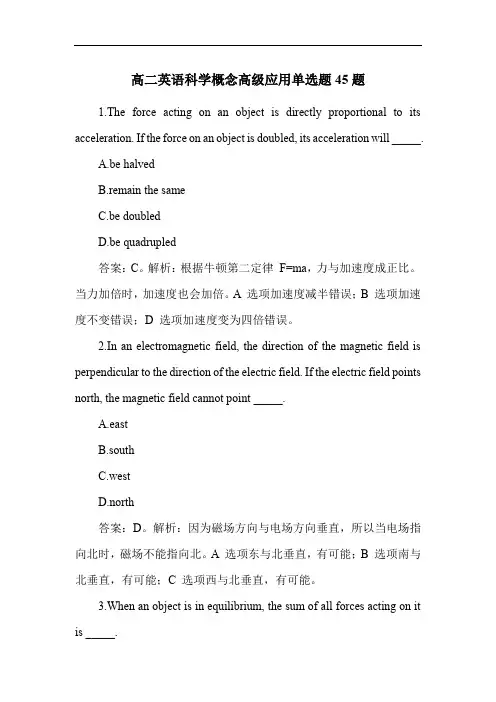
高二英语科学概念高级应用单选题45题1.The force acting on an object is directly proportional to its acceleration. If the force on an object is doubled, its acceleration will _____.A.be halvedB.remain the sameC.be doubledD.be quadrupled答案:C。
解析:根据牛顿第二定律F=ma,力与加速度成正比。
当力加倍时,加速度也会加倍。
A 选项加速度减半错误;B 选项加速度不变错误;D 选项加速度变为四倍错误。
2.In an electromagnetic field, the direction of the magnetic field is perpendicular to the direction of the electric field. If the electric field points north, the magnetic field cannot point _____.A.eastB.southC.westD.north答案:D。
解析:因为磁场方向与电场方向垂直,所以当电场指向北时,磁场不能指向北。
A 选项东与北垂直,有可能;B 选项南与北垂直,有可能;C 选项西与北垂直,有可能。
3.When an object is in equilibrium, the sum of all forces acting on it is _____.A.zeroB.greater than zeroC.less than zeroD.indeterminate答案:A。
解析:物体处于平衡状态时,所受合力为零。
B 选项大于零错误,物体将有加速度;C 选项小于零错误,同理;D 选项不确定错误。
4.The work done on an object is equal to the force applied multiplied by the distance moved in the direction of the force. If a force of 10 N moves an object 5 meters in its direction, the work done is _____.A.2 JB.50 JC.15 JD.25 J答案:B。

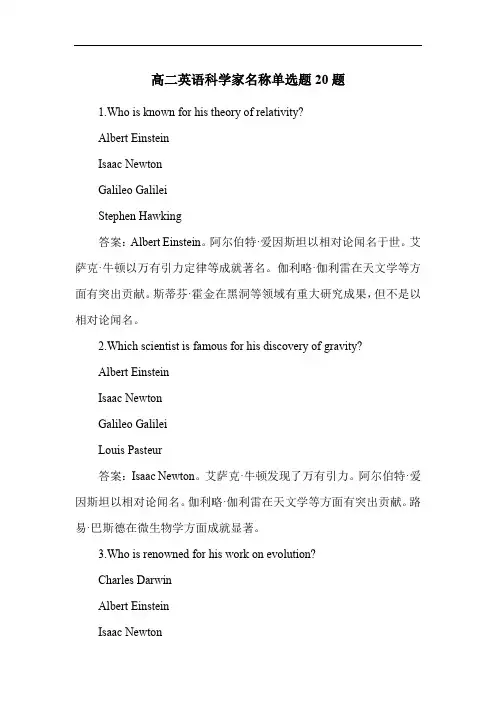
高二英语科学家名称单选题20题1.Who is known for his theory of relativity?Albert EinsteinIsaac NewtonGalileo GalileiStephen Hawking答案:Albert Einstein。
阿尔伯特·爱因斯坦以相对论闻名于世。
艾萨克·牛顿以万有引力定律等成就著名。
伽利略·伽利雷在天文学等方面有突出贡献。
斯蒂芬·霍金在黑洞等领域有重大研究成果,但不是以相对论闻名。
2.Which scientist is famous for his discovery of gravity?Albert EinsteinIsaac NewtonGalileo GalileiLouis Pasteur答案:Isaac Newton。
艾萨克·牛顿发现了万有引力。
阿尔伯特·爱因斯坦以相对论闻名。
伽利略·伽利雷在天文学等方面有突出贡献。
路易·巴斯德在微生物学方面成就显著。
3.Who is renowned for his work on evolution?Charles DarwinAlbert EinsteinIsaac NewtonGalileo Galilei答案:Charles Darwin。
查尔斯·达尔文以进化论闻名。
阿尔伯特·爱因斯坦以相对论闻名。
艾萨克·牛顿以万有引力定律等成就著名。
伽利略·伽利雷在天文学等方面有突出贡献。
4.Which scientist is associated with the discovery of penicillin?Alexander FlemingAlbert EinsteinIsaac NewtonGalileo Galilei答案:Alexander Fleming。
亚历山大·弗莱明发现了青霉素。
2016年3月中国科学院考博英语真题试卷(题后含答案及解析)题型有:1. Structure and V ocabulary 2. Cloze 3. Reading Comprehension 4. English-Chinese Translation 5. WritingStructure and V ocabulary1.Google is not the only search utility in town, but it comes with such a(n) ______collection of tools to focus your search that it is the engine of choice for many of us.A.comparableB.formidableC.innumerableD.compatible正确答案:B解析:本题考查形容词的语义。
A可比较的;B强大的;C无数的;D兼容的。
该句的大意为:谷歌并非唯一的搜索工具,不过,它强大的工具集合能够专注搜索,因此谷歌是大多数人选择使用的搜索引擎。
2.The defect in David’s character has______him from advancement in his career.A.exemptedB.forbiddenC.underminedD.hindered正确答案:D解析:本题考查动词的语义。
A免除;B禁止;C破坏;D阻碍。
该句的大意为:大卫性格上的缺陷阻碍了他的事业发展。
3.The theory that business could operate totally without the aid of government has proved to be a (n) ______.A.allusionB.seclusionC.illusionD.confusion正确答案:C解析:本题考查名词的语义。
高二英语科学研究单选题50题1. In the famous double - slit experiment in physics, scientists _____ observe the wave - particle duality of light.A. managed toB. tried toC. succeeded toD. aimed to答案:A。
解析:manage to表示成功做到某事,在这个语境中,科学家成功地观察到了光的波粒二象性,强调结果。
try to只是试图做某事,不强调结果是否成功。
succeed后面直接接in doing sth,没有succeed to这种用法。
aim to表示目的是做某事,侧重于目的而非结果。
2. The research on gene editing, like CRISPR - Cas9, has _____ many ethical discussions.A. given rise toB. put up withC. made up forD. caught up with答案:A。
解析:give rise to表示引起、导致,基因编辑的研究引起了很多伦理讨论。
put up with忍受,make up for弥补,catch up with 赶上,这几个短语不符合句子语境。
3. Darwin's theory of evolution was based on his _____ observationsduring his voyage on the Beagle.A. extensiveB. intensiveC. expansiveD. expensive答案:A。
解析:extensive广泛的,达尔文在小猎犬号航行期间进行了广泛的观察,这为他的进化论奠定了基础。
intensive集中的、加强的,expansive广阔的、扩张的,expensive昂贵的,后三个词不符合语境。
高一英语学术用语单选题50题1. In an academic paper, when you present an idea that you will test, you call it a ____.A. resultB. hypothesisC. factD. theory答案:B。
解析:在学术论文中,当提出一个将要进行测试的想法时,这个想法被称为假设,“hypothesis”就是假设的意思。
A选项“result”是结果,是经过测试等得出的最终成果,不是刚开始提出的待测试的想法。
C选项“fact”是事实,是已经被证实的情况,不是待测试的想法。
D选项“theory”是理论,是经过大量研究和论证形成的一套体系,也不是刚开始提出的待测试的想法。
2. At the end of an academic research, we usually draw a ____.A. decisionB. conclusionC. choiceD. judgment答案:B。
解析:在学术研究结束时,通常会得出一个结论,“conclusion”有结论的意思。
A选项“decision”更多指做决定,侧重于在不同选项之间做出抉择,与学术研究得出结果的语境不符。
C选项“choice”是选择,与学术研究得出最终结果的含义不同。
D选项“judgment”更多指判断、评判,不是学术研究最后得出的结论的意思。
3. When we want to add more information in an academic paper, we can use the phrase ____.A. in factB. in generalC. in additionD. in short答案:C。
解析:在学术论文中,当想要添加更多信息时,常用“in addition”这个短语。
A选项“in fact”是事实上,用于强调事实情况,不是用于添加信息。
矿产资源开发利用方案编写内容要求及审查大纲
矿产资源开发利用方案编写内容要求及《矿产资源开发利用方案》审查大纲一、概述
㈠矿区位置、隶属关系和企业性质。
如为改扩建矿山, 应说明矿山现状、
特点及存在的主要问题。
㈡编制依据
(1简述项目前期工作进展情况及与有关方面对项目的意向性协议情况。
(2 列出开发利用方案编制所依据的主要基础性资料的名称。
如经储量管理部门认定的矿区地质勘探报告、选矿试验报告、加工利用试验报告、工程地质初评资料、矿区水文资料和供水资料等。
对改、扩建矿山应有生产实际资料, 如矿山总平面现状图、矿床开拓系统图、采场现状图和主要采选设备清单等。
二、矿产品需求现状和预测
㈠该矿产在国内需求情况和市场供应情况
1、矿产品现状及加工利用趋向。
2、国内近、远期的需求量及主要销向预测。
㈡产品价格分析
1、国内矿产品价格现状。
2、矿产品价格稳定性及变化趋势。
三、矿产资源概况
㈠矿区总体概况
1、矿区总体规划情况。
2、矿区矿产资源概况。
3、该设计与矿区总体开发的关系。
㈡该设计项目的资源概况
1、矿床地质及构造特征。
2、矿床开采技术条件及水文地质条件。